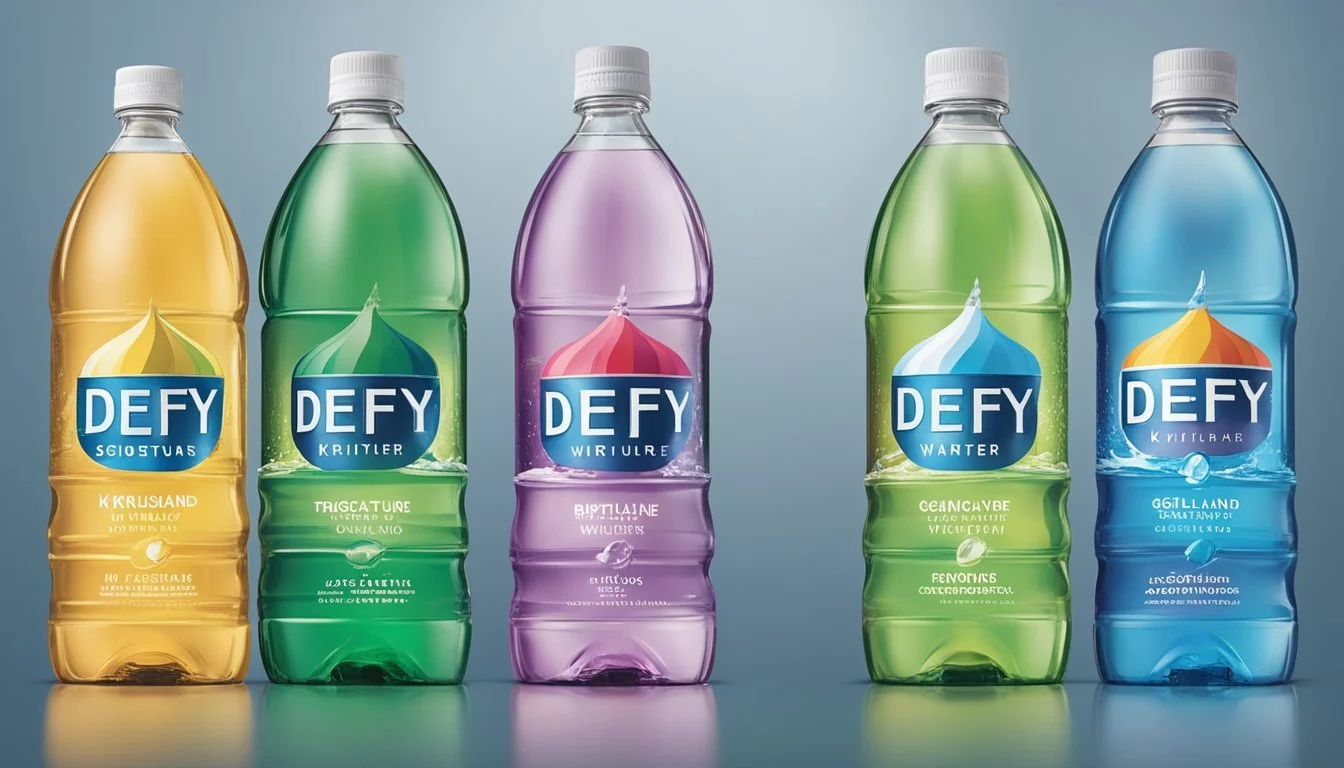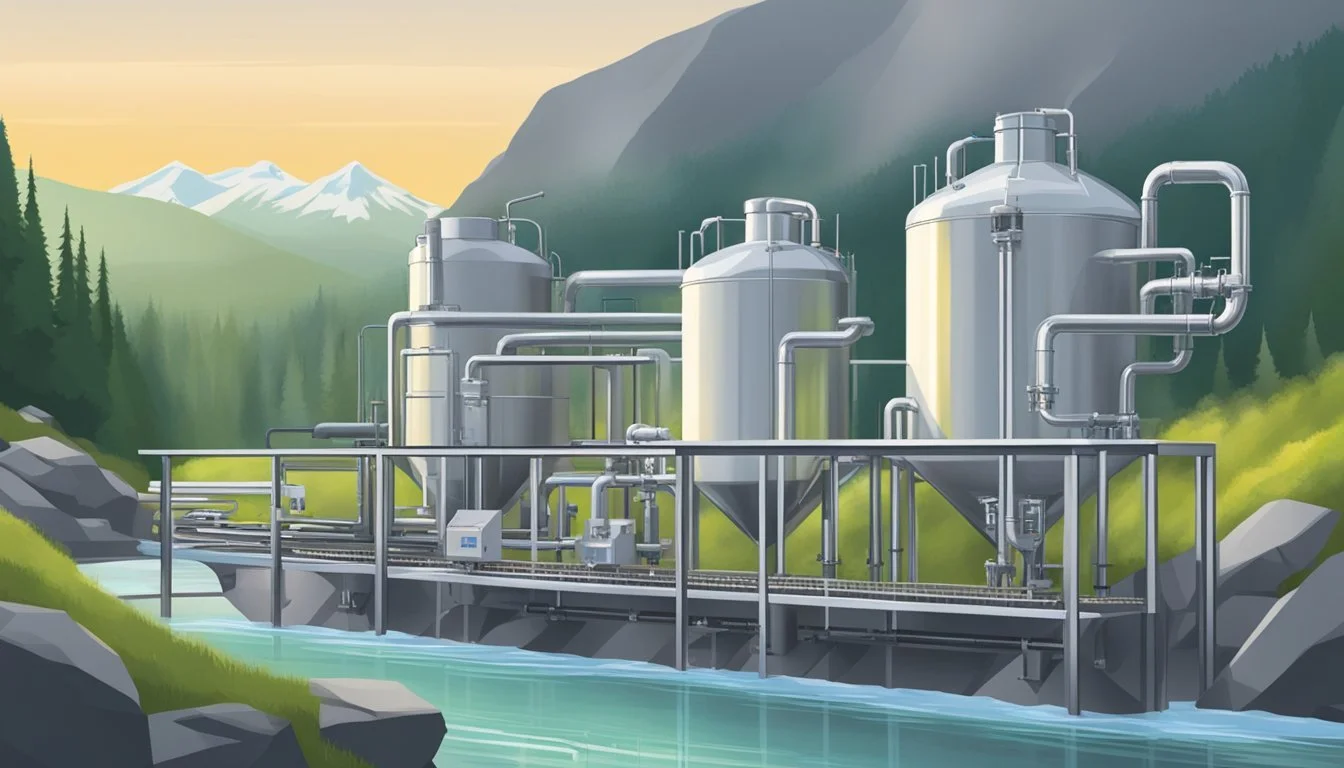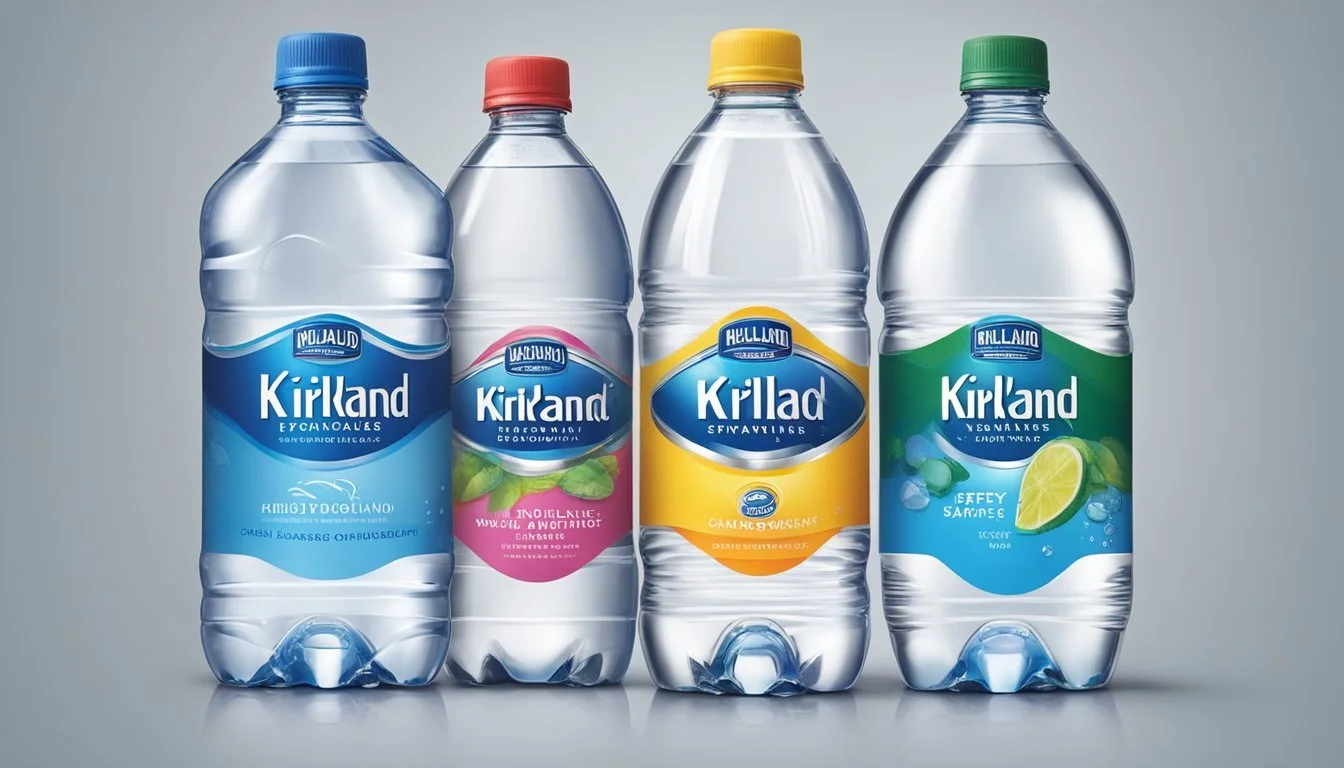Defy vs. Kirkland Signature
Comparing Bottled Water Quality and Value
Choosing the right bottled water can be surprisingly challenging given the vast array of options available today. Two brands that often come up for comparison are Defy and Kirkland Signature. While both have their merits and downsides, understanding their key characteristics sets the stage for making an informed decision.
Defy is known for its alkaline water, often praised for its potential health benefits such as better hydration and improved energy levels. Kirkland Signature, on the other hand, offers a reliable and affordable purified water option, making it a favorite among many consumers for everyday use.
Each brand provides unique benefits that cater to different needs and preferences. Whether you prioritize enhanced hydration or cost-effective purity, this comparison aims to guide you through the essential differences to determine which bottled water is the better choice for you.
Overview of Defy and Kirkland Signature Bottled Water
Defy and Kirkland Signature, two prominent bottled water brands, cater to diverse hydration needs.
Kirkland Signature, a Costco subsidiary, offers Kirkland Signature purified water. This water undergoes multiple purification processes, including reverse osmosis, ionization, and advanced filtration. Kirkland effectively eliminates impurities, ensuring a clean taste.
Kirkland Signature water is produced by Niagara Bottling, a leading private-label bottled water company founded in 1963. Niagara's processes and commitment to quality have contributed significantly to Kirkland's market presence.
Defy bottled water, on the other hand, might not be as widely recognized but focuses on providing high-quality hydration solutions. Their emphasis is on purity and taste, ensuring consumers receive a refreshing drinking experience.
Both brands target consumers looking for reliable and purified bottled water. Costco plays a pivotal role in the wide distribution of Kirkland Signature water, making it accessible to a large customer base.
The choice between Defy and Kirkland Signature depends on individual preferences for taste, purity, and brand loyalty.
Water Source and Purification Process
Defy and Kirkland Signature bottled waters differ significantly in their water sources, filtration methods, and bottling procedures. Understanding these differences is crucial for informed purchasing decisions.
Sourcing of Water
Defy sources its water from natural springs. These sources are often located in remote, pristine environments, providing naturally filtered water rich in minerals and electrolytes.
Kirkland Signature, on the other hand, primarily uses purified water which starts as municipal tap water. This allows Kirkland to maintain consistent quality and availability.
Filtration and Purification Techniques
Defy emphasizes minimal processing to retain the natural mineral content of the spring water. The water undergoes basic filtration to remove physical impurities, followed by ultraviolet (UV) radiation and ozonation to ensure it is microbiologically safe.
Kirkland Signature uses a more extensive purification process involving reverse osmosis and micro-filtration. The water’s Total Dissolved Solids (TDS) is reduced to as low as 26 ppm. Post filtration, Kirkland adds essential minerals to improve taste.
Bottling Process
Defy employs a stringent bottling process that prioritizes preserving the water’s natural qualities. The process includes immediate bottling at the source to prevent contamination.
Kirkland Signature utilizes advanced bottling facilities that ensure high efficiency and hygiene. The purified and mineral-added water is then bottled in BPA-free plastic bottles. Rigorous quality control measures are enforced at every stage.
Both brands ensure that their bottling processes meet high standards of hygiene and safety. However, the focus on either retaining natural properties or ensuring maximum purification differentiates their approaches.
Quality and Safety Standards
Defy and Kirkland Signature both adhere to rigorous quality and safety standards to ensure their bottled water is safe for consumption. These standards are governed by entities like the EPA, FDA, and the International Bottled Water Association (IBWA).
Monitoring and Compliance
Both Defy and Kirkland Signature follow strict monitoring and compliance protocols. The FDA enforces regulations that bottled water must meet the same safety standards as EPA's tap water requirements. Monitoring involves regular testing for contaminants such as PFAS, bacteria, and chemical residues.
Defy employs advanced filtration systems and conducts periodic checks to maintain purity. Kirkland Signature, sourced from reliable water sources, also undergoes rigorous testing. Consumer Reports notes that Kirkland water is free from harmful chemicals, ensuring it meets high-quality standards repeatedly.
Health and Safety Certifications
Health and safety certifications for both brands are essential. Defy is certified by the IBWA, complying with standards that sometimes exceed those of the FDA and EPA. These certifications ensure the water is not only safe but also of the highest quality.
Kirkland Signature has garnered approvals including an "A grade" from health monitoring entities. This reassures consumers of its commitment to healthy, safe drinking water. Both brands’ certifications reflect their rigorous adherence to health and safety protocols, making them trusted names in the bottled water industry.
Taste Profile and Mineral Content
Kirkland Signature and Defy have distinct taste profiles influenced by their pH levels, mineral content, and added electrolytes. Understanding these differences can help consumers decide which bottled water suits their needs.
PH Levels and Alkalinity
Kirkland Signature water has a pH level of 9.5, making it highly alkaline. This high pH can result in a smoother, less acidic taste, which some people find appealing. The alkaline nature helps to neutralize acidity in the body, which is why it's often marketed as a health-conscious choice. The alkalinity is primarily achieved through reverse osmosis and the addition of electrolytes.
Defy offers a balanced pH level between 7 and 8, closer to neutral. This makes Defy's taste more neutral, which can be preferable for those who do not enjoy the slightly sweet or saccharine profile associated with higher pH levels. Natural spring sources typically maintain this balanced pH, contributing to a clean, crisp taste.
Mineral and Electrolyte Enhancement
Kirkland Signature water benefits from added minerals such as magnesium oxide and potassium chloride, which enhance its taste and purported health benefits. These minerals can slightly alter the flavor, giving it a subtle, yet distinct taste profile. The presence of these minerals also provides electrolytes, which can be beneficial for hydration and replenishment after physical activity.
Defy water sources naturally contain minerals, which are left intact to preserve the water's original taste. This allows it to maintain a pure, clean flavor profile without the need for additional mineral enhancement. The naturally occurring bicarbonate and other minerals contribute to its refreshing and subtle taste.
In summary, Kirkland Signature's added minerals and higher pH level create a unique taste and alkaline profile, while Defy's natural mineral content and near-neutral pH offer a clean, crisp drinking experience.
Environmental Impact and Sustainability
Evaluating the environmental impact and sustainability of Defy and Kirkland Signature bottled water involves examining the production of the bottles and conservation of water sources. Both aspects contribute significantly to their overall environmental footprint.
Bottle Production
The production of plastic bottles significantly influences the environmental impact. Defy uses PET plastic for its bottles, which are designed to be recyclable. However, the recycling rate for PET plastic remains relatively low globally, resulting in substantial plastic waste.
Kirkland Signature also uses PET plastic for its bottles, but with a focus on lightweight design to reduce material usage. This effort helps to decrease the plastic per bottle, contributing to less waste.
Both brands face challenges in ensuring that their bottles are recycled properly. Encouraging consumer participation in recycling programs and improving the collection infrastructure is essential.
Water Source Conservation
Water source conservation is critical for sustainability. Defy sources its water from natural springs, ensuring that they adhere to strict environmental standards. Protecting these natural sources helps maintain the surrounding ecosystems.
Kirkland Signature sources its water from both springs and municipal sources. The company implements measures to manage water use efficiently and minimize environmental disruption.
The practice of sourcing water from various locations can help mitigate the environmental impact, but also requires stringent regulation to protect water sources. Both brands can improve transparency in their water sourcing to build consumer trust and demonstrate commitment to sustainability.
Packaging and Branding
Kirkland Signature is Costco's proprietary brand, recognizable for its minimalist yet professional design. The bottles are clear and sturdy, with straightforward labeling that includes the brand name in bold letters. The branding ethos emphasizes quality and reliability, aligning with Costco's reputation for cost-effective, high-quality products.
Defy's branding is more vibrant and engaging, aiming to attract a younger, active demographic. The packaging often features bold colors and modern design elements. Defy bottles are ergonomically shaped, making them easy to carry during physical activities. The labels are more visually striking, incorporating creative graphics and taglines to appeal to a trend-conscious audience.
Feature Kirkland Signature Defy Bottle Design Clear, sturdy, ergonomic Ergonomic, colorful, modern Label Style Minimalist, professional, bold lettering Vibrant, eye-catching, creative Target Market Cost-conscious, quality-seeking consumers Active, youthful, trend-conscious
While Kirkland Signature focuses on a straightforward, no-frills approach, Defy takes a more dynamic and aesthetic route. These branding choices are evident in both the packaging design and market positioning. Kirkland aims for simplicity and trust, whereas Defy seeks to capture the attention and loyalty of a more adventurous consumer base.
Comparative Analysis with Competing Brands
Kirkland Signature and Defy bottled waters offer unique qualities that differentiate them from competitors such as Dasani, Fiji, and Smartwater.
Comparison to Other Popular Brands
Dasani: Kirkland and Defy provide a more natural taste compared to Dasani, which is often criticized for its added minerals. Consumers seeking purity might lean towards Kirkland or Defy over Dasani.
Fiji: Fiji water is known for its smooth taste and originates from an artisanal aquifer. This gives Fiji a premium status. Kirkland offers similar quality but at a more affordable price, presenting a value proposition.
Smartwater: Smartwater is vapor-distilled and contains added electrolytes. Defy emphasizes its alkaline properties while Kirkland focuses on the source quality, making both suitable for specific preferences in mineral content.
Evian: Evian's taste is attributed to its French Alps origin. While Kirkland and Defy might lack the prestige, they offer competitive quality without the import costs associated with Evian.
Essentia: Known for its high pH level, Essentia markets itself as hydration-focused. Defy also highlights its pH level, creating direct competition in the alkaline water segment. Kirkland remains steady with its dependable sourcing.
Perrier and San Pellegrino: These sparkling waters offer a different drinking experience. While not directly competitive, Kirkland provides a still water alternative when consumers seek non-carbonated options.
Core Hydration: Core promotes balanced pH and prominent packaging. Defy's branding and alkaline nature put it head-to-head with Core. Kirkland's strategy lies in reliable quality rather than unique marketing.
Aquafina: Similar to Dasani, Aquafina is another mass-market option that Kirkland and Defy can outperform in terms of natural taste and fewer additives.
Voss and Icelandic Glacial: These brands appeal with premium aesthetics and purity claims. Despite not matching the luxury image, Kirkland and Defy can win over with their practical quality and lower price points.
Pure Life and Arrowhead: Both offer wide availability and are known for regional sourcing. Kirkland's consistent quality and Defy's health branding give them an edge in attracting health-conscious buyers.
Boxed Water: This eco-friendly brand differs in packaging. Kirkland and Defy compete on the basis of taste and water properties rather than packaging innovations.
By evaluating the strengths and unique offerings of these brands, consumers can better understand how Kirkland Signature and Defy fit into the broader bottled water market.
Consumer Insights and Reviews
Defy and Kirkland Signature bottled waters have garnered various reactions from consumers and experts alike. This section explores customer testimonials and expert opinions to provide a balanced perspective.
Customer Testimonials
Consumers who prefer Defy often highlight its crisp taste and branding, which resonates with those seeking a premium product. They frequently mention the water's smooth mouthfeel and subtle mineral profile. On social media, positive anecdotes often emphasize the enjoyable drinking experience.
Kirkland Signature, on the other hand, is praised for its value and reliability. Costco shoppers appreciate the affordability and consistency of this water, making it a household staple. User reviews on retail sites frequently mention the convenience of buying in bulk and the trust associated with the Costco brand.
Expert Opinions
Water sommeliers and investigators provide deeper insights into these brands. Defy is recognized for its high-quality sourcing and meticulous filtration processes. Experts note the premium feel and the brand’s focus on offering a differentiated product in the crowded bottled water market.
Consumer Reports and medical reviews have validated the safety and quality of Kirkland Signature water. Experts highlight the rigorous standards upheld by Niagara Bottling Company. Panels reviewing bottled waters often commend Kirkland's balance of taste and cost, making it a top choice for budget-conscious consumers.
Expert insights come from thorough assessments and comparisons, making their evaluations extremely valuable for discerning buyers.
How to Choose the Right Bottled Water for You
Choosing the right bottled water depends on several key factors.
Source: Consider where the water comes from. Spring and mineral waters often contain natural minerals beneficial for health. Alkaline water, known for its higher pH level, can provide specific health benefits.
Purified Water: Purified water goes through extensive processes like distillation, deionization, or reverse osmosis to remove impurities. This can offer a clean-tasting, safe option, especially in areas with uncertain tap water quality.
Mineral Content: Examining the mineral content is crucial. Minerals like calcium, magnesium, and potassium contribute to health and hydration. Some bottled waters retain these natural minerals, enhancing both taste and nutritional value.
Taste: Personal preference in taste can influence your choice. Some people prefer the taste of spring water, which is often described as crisp and refreshing. Others might opt for the neutral taste of purified water.
Hydration Needs: If hydration is the primary goal, any safe drinking water should suffice. It’s essential to drink water that you find pleasant and convenient, ensuring you stay well-hydrated throughout the day.
Packaging: Look for recyclable packaging to reduce environmental impact. Brands that prioritize sustainability, such as those using 100% recyclable materials, can be a better choice for eco-conscious consumers.
By considering these factors, individuals can make an informed decision on the best bottled water to suit their needs and preferences.
More About Defy
Mountain Valley Spring Water vs Defy: Which Bottled Water is Better?
Whole Foods Italian Still Mineral water vs Defy: Which Bottled Water is Better?
More About Kirkland Signature
1907water vs Kirkland Signature: Which Bottled Water is Better?
7-Select vs Kirkland Signature: Which Bottled Water is Better?
Acqua Pana vs Kirkland Signature: Which Bottled Water is Better?
Alkaline88 vs Kirkland Signature: Which Bottled Water is Better?
Antipodes vs Kirkland Signature: Which Bottled Water is Better?
Aqua Carpatica vs Kirkland Signature: Which Bottled Water is Better?
Aquafina vs Kirkland Signature: Which Bottled Water is Better?
Arrowhead vs Kirkland Signature: Which Bottled Water is Better?
Big Chill vs Kirkland Signature: Which Bottled Water is Better?
Big Win vs Kirkland Signature: Which Bottled Water is Better?
BodyArmor vs Kirkland Signature: Which Bottled Water is Better?
Boxed Water vs Kirkland Signature: Which Bottled Water is Better?
Cascade Mountain vs Kirkland Signature: Which Bottled Water is Better?
Castle Rock vs Kirkland Signature: Which Bottled Water is Better?
Core Hydration vs Kirkland Signature: Which Bottled Water is Better?
Crystal Geyser vs Kirkland Signature: Which Bottled Water is Better?
Deer Park vs Kirkland Signature: Which Bottled Water is Better?
Erewhon vs Kirkland Signature: Which Bottled Water is Better?
Essentia vs Kirkland Signature: Which Bottled Water is Better?
Eternal vs Kirkland Signature: Which Bottled Water is Better?
Hawaii Volcanic vs Kirkland Signature: Which Bottled Water is Better?
Hawaiian Springs vs Kirkland Signature: Which Bottled Water is Better?
Ice Mountain vs Kirkland Signature: Which Bottled Water is Better?
Icelandic Glacial vs Kirkland Signature: Which Bottled Water is Better?
Just Water vs Kirkland Signature: Which Bottled Water is Better?
Kirkland Signature vs Action: Which Bottled Water is Better?
Kirkland Signature vs CBD Living: Which Bottled Water is Better?
Kirkland Signature vs Crystal Lake: Which Bottled Water is Better?
Kirkland Signature vs Dasani: Which Bottled Water is Better?
Kirkland Signature vs Essence pH10: Which Bottled Water is Better?
Kirkland Signature vs HFactor: Which Bottled Water is Better?
Kirkland Signature vs Proud Source: Which Bottled Water is Better?
Kirkland Signature vs Ramona: Which Bottled Water is Better?
Kroger vs Kirkland Signature: Which Bottled Water is Better?
LIFEWTR vs Kirkland Signature: Which Bottled Water is Better?
Liquid Death vs Kirkland Signature: Which Bottled Water is Better?
Mananalu vs Kirkland Signature: Which Bottled Water is Better?
Mountain Valley Spring Water vs Kirkland Signature: Which Bottled Water is Better?
Nestle Pure Life vs Kirkland Signature: Which Bottled Water is Better?
Open Water vs Kirkland Signature: Which Bottled Water is Better?
Ophora vs Kirkland Signature: Which Bottled Water is Better?
Origin vs Kirkland Signature: Which Bottled Water is Better?
Ozarka vs Kirkland Signature: Which Bottled Water is Better?
Perrier vs Kirkland Signature: Which Bottled Water is Better?
Poland Spring vs Kirkland Signature: Which Bottled Water is Better?
Pure Life vs Kirkland Signature: Which Bottled Water is Better?
Purely Sedona vs Kirkland Signature: Which Bottled Water is Better?
Refreshe vs Kirkland Signature: Which Bottled Water is Better?
Richard's Rainwater vs Kirkland Signature: Which Bottled Water is Better?
San Pellegrino vs Kirkland Signature: Which Bottled Water is Better?
Simple Truth vs Kirkland Signature: Which Bottled Water is Better?
Smartwater vs Kirkland Signature: Which Bottled Water is Better?
Solan de Cabras vs Kirkland Signature: Which Bottled Water is Better?
Starkey vs Kirkland Signature: Which Bottled Water is Better?
Talking Rain AQA vs Kirkland Signature: Which Bottled Water is Better?
The Well vs Kirkland Signature: Which Bottled Water is Better?
Topo Chico vs Kirkland Signature: Which Bottled Water is Better?
Tru Alka vs Kirkland Signature: Which Bottled Water is Better?
Volvic vs Kirkland Signature: Which Bottled Water is Better?
Waiakea vs Kirkland Signature: Which Bottled Water is Better?
Weird Water vs Kirkland Signature: Which Bottled Water is Better?
Whole Foods 365 vs Kirkland Signature: Which Bottled Water is Better?
Whole Foods Italian Still Mineral water vs Kirkland Signature: Which Bottled Water is Better?
Zenwtr vs Kirkland Signature: Which Bottled Water is Better?
Zephyrhills vs Kirkland Signature: Which Bottled Water is Better?






